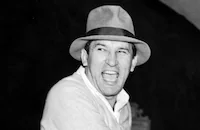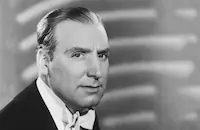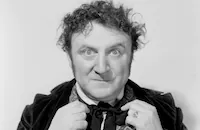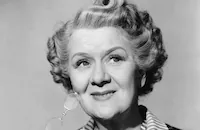Jewel Robbery

Brief Synopsis
Cast & Crew
William Dieterle
William Powell
Kay Francis
Helen Vinson
Hardie Albright
Alan Mowbray
Film Details
Technical Specs

Synopsis
The Baroness Teri has a wealthy husband who indulges her, but she is bored by him and by her lovers and longs for some excitement. She meets her husband, the Baron at an exclusive Viennese jewelry store where he has promised to buy her a twenty-eight carat diamond ring. Just as he manages to buy the ring for a good price, a sophisticated, well-dressed robber breaks into the store. As his men proceed to empty the cases and relieve the customers of their jewelry, the robber carries on a flirtatious conversation with Teri. She is charmed, and when the robber offers the customers a choice between being locked in the safe or smoking a drugged cigarette, she declines either option, protesting that she has no desire to see him arrested. When she arrives home, she finds her bedroom filled with roses and her diamond ring in the safe. Soon she discovers that the robber has accompanied the flowers. She begs him to take back her ring in order to save her reputation, explaining that she will not be able to wear it without telling how she got it back. While they talk, a policeman arrives, having trailed a suspicious character to her house. He finds the ring and the other stolen jewels in her safe and starts to arrest her, but the robber steps out from his hiding place to save her. The policeman takes them both along, but to Teri's surprise, they do not go to the police station but to the robber's apartment. The man she supposed to be a policeman is actually one of the robber's men. The robber asks her to come away to Nice with him. She agrees to meet him, but before she can leave, the real police arrive. The robber ties her up in order to save her reputation before he escapes over the roof. When she is released from her bonds, she announces that she needs to restore her nerves by a vacation in Nice, where she intends to meet the robber.

Director

William Dieterle
Cast

William Powell

Kay Francis

Helen Vinson

Hardie Albright

Alan Mowbray
Andre Luget

Henry Kolker
Spencer Charters
Lee Kohlmar
Clarence Wilson
Robert Greig

Lawrence Grant
Jacques Vanaire
Harold Minjir
Ivan Linow
Harold Waldridge
Charles Coleman

Herman Bing

Ruth Donnelly

C. Henry Gordon
Crew

Videos
Movie Clip




Trailer
Hosted Intro
Film Details
Technical Specs

Articles
Jewel Robbery
1932 was a good year for urbane characters and opulent settings, even though the country was in the midst of a depression. Ernst Lubitsch's elegant continental comedy, Trouble in Paradise was also released that year and shared two things in common with Jewel Robbery - a plot involving professional thieves and Kay Francis who starred in both films. The public loved to watch these rich people cavort on the screen, deriving great pleasure from their fantasy worlds of wealth and privilege. And Powell had a wry sense of humor and an easy-going yet debonair charm that made him instantly likable in his upper crust roles. In Jewel Robbery, he is perfectly cast as a suave jewel thief operating in Vienna where he masquerades as a fine arts connoisseur. When the film opens, he has his eye on his next victim, the bored and very married Baroness Teri von Hohenfels played by Kay Francis. They meet at a jewelry store as The Robber slows down the reactions of the guard and owner of the store by slipping them a marijuana cigarette. Then, while distracting everyone in the store, he cleverly helps himself to the best gems on display, including a diamond just purchased for Teri by her husband. Naturally, Teri is attracted to the jewel thief but she resists him at first, even though we know they are fated to meet again and to fall in love.
Depression era audiences were certainly intrigued and even excited about the novel introduction of that "funny" cigarette in Jewel Robbery, but they were also entertained by the terrific dialogue served up by screenwriter Erwin Gelsey. They were also pleased to see another screen pairing of Powell and Francis who were co-starring in their fifth together; they made a total of seven. But Powell didn't want to do the movie at first. He was happily married and quite comfortable at home with his new bride, Carole Lombard. Now that he was about to turn forty, he also wanted a slower pace and a less stressful work schedule. As noted in Gentleman, The William Powell Story by Charles Francisco, Powell was also not interested in "Éprojecting his charm as a 'ladies man' once more." Yet, he was able to see that the part of The Robber was more than simply an elegant seducer, "He found his role of the jewel thief, torn between love and dishonor, highly amusing."
Although Powell is remembered mostly for The Thin Man series (he made six of them, from 1934 to 1947, with Myrna Loy), his earlier work with Kay Francis is equally enjoyable. The smartly dressed, cynical leading man was meant for the stylish and worldly Francis. As the much revered character actress Aline MacMahon recalled in the Francisco biography, "After you say talent, then you have to ask, What does the audience want? The audiences wanted what Miss Francis had. After all, Kay Francis was in a special class. She was very elegant, and she had taste and special clothes, and she fulfilled a need audiences felt." It was this screen persona that made Francis the ideal choice to play the Baroness. It was easy to believe she could fall in love with Powell's debonair robber.
As for Powell, he was someone who never failed to entertain moviegoers, from his villainous roles in silent films to his immortal Thin Man series to his sterling work in such comedy favorites as My Man Godfrey (1936) and Life with Father (1947). But the actor never allowed the public to see that his own life was less than ideal. He suffered a number of disappointments and personal tragedies such as his short-lived marriage to Lombard (1931-1933), the unexpected death of Jean Harlow (whom, it was rumored, he wanted to marry) and a personal bout with cancer. Doctors told him he would probably die from the disease before he was 46 but Powell beat the odds and lived to the ripe old age of 92. He eventually called it quits as an actor at the age of 63; his last movie was Mister Roberts (1955) and he was unforgettable as the ship's philosophical doctor, a wise and eloquent gentleman who was truly the last of his breed.
Director: William Dieterle
Screenplay: Bertram Bloch, Ladislas Fodor (play), Erwin S. Gelsey
Art Direction: Robert M. Haas
Cinematography: Robert Kurrle
Editing: Ralph Dawson
Music: Bernhard Kaun
Cast: William Powell (Robber), Kay Francis (Baroness Teri von Hohenfels), Helen Vinson (Marianne), Hardie Albright (Paul), Alan Mowbray (Fritz), Andre Luguet (Count Andre), Henry Kolker (Baron Franz von Hohenfels).
BW-69m.
by Joseph D'Onofrio

Jewel Robbery
Forbidden Hollywood Collection Volume Four - Kay Francis, William Powell, Loretta Young, Joan Blondell & Others in FORBIDDEN HOLLYWOOD Volume 4
First up is the light-as-air romantic crime caper Jewel Robbery from 1932, which features Kay Francis in a role similar to her society girl/thief target role in the same year's Trouble in Paradise. Here she's teamed up with William Powell, her leading man in the previous For the Defense, Ladies' Man, and Street of Chance, with the tragic romance One Way Passage marking their final collaboration later that same year.
Things start off with a bang as a cocky demonstration of a new burglar alarm system turns out to be very fallible within minutes, followed by a saucy introduction to Francis as the wealthy Baroness Teri clambering out of a bubble bath. "Imagine having a husband like yours who would gladly spend a fortune just to make you happy" remarks her best friend Marianne (Helen Vinson), but Teri is bored with her life and longs for a little excitement to shake things up. That comes in the form of a suave burglar (Powell, of course), who has his eye on a valuable diamond Teri's just received and tosses out lines like "Did anyone tell you your eyes are like sapphires?" Of course, it's only a matter of time before his intricate scheme takes a romantic turn.
A fitting opener for this set, Jewel Robbery is both slick and shiny and far more daring than the Hays Code-era caper comedies to come. Powell's method of softening up entire rooms of potential victims with "funny" cigarettes that cause people to giggle and wake up "with an enormous appetite" will be enough to delight fans of Reefer Madness, and the whole film has a deliciously amoral atmosphere of Viennese decadence. The similarities to Ernst Lubitsch are obvious, of course, but this is really a Dieterle film all the way including an expressionistic nocturnal climax across the rooftops of Vienna that wouldn't be out of place in a Universal monster film. The final shot is deliciously surprising as well, with Francis breaking the fourth wall in as charming a manner as possible. The film elements here are in fine shape, with very few blemishes and an satisfying replication of the glossy cinematic sheen familiar from some of the other Powell/Francis films. The theatrical trailer is also included, though it barely conveys any idea at all about the content of the film itself.
Powell and Dieterle pop up again for the same year's Lawyer Man, a far more dramatic portrayal of the legal profession circa '32 complete with rat-a-tat dialogue, sexy innuendo, and scheming criminals. Good guy Anton Adam (Powell) is a struggling lawyer on the Lower East Side with enough street smarts to whack a misbehaving, chair-wielding client in the jaw. His tenacity gets gets him a fancier new uptown office for him and his dedicated secretary, Olga (Joan Blondell), but his prosecuting of prominent racketeer John Gilmurry (David Landau) endangers his trip up the professional ladder when Gilmurry decides to get even in and outside the courtroom.
Apart from a few leering shots of ladies' legs and some belching, there isn't anything too scandalous about this one. Instead, Lawyer Man is primarily of interest for its portrayal of contrasting sides of New York: one a lower class street teeming with icemen on horse-drawn carriages, the other a stifling maze of offices and buzzing telephones. Lawyer movies were popular properties at the time, and this one is rather par for the course as Powell charts the dangerous waters of the legal system along with his possibly deceptive new partner, Granville Bentley (Alan Dinehart), and his predatory sister (Vinson again). The subject matter would have easily turned into a crime film, but the antagonism between the male leads in the film remains oddly civilized and even playful, including a mid-film twist or two that threaten to compromise our hero's character once and for all. Blondell is a joy to watch as usual and essentially wipes all the other women off the screen, though it's a more chaste and restrained part than usual for her as she essentially moons over a man she can't have through most of the running time. Once again the transfer from solid film elements has a few scratches here and there but nothing too distracting, and the black levels look very rich and impressive here. Again the trailer is the sole extra, devoted mainly to a bit of Powell speechifying that makes the film look much more somber than it actually is.
The third disc plays a bit of musical chairs as this time it's Dieterle and Francis joining again for Man Wanted. Leading man duties this time go to David Manners (best known for the Universal horror films Dracula, The Mummy, and The Black Cat) as Tom, a go-getting young man who tries to sell a rowing machine in the office of magazine editor Lois Ames (Francis, once more an unsatisfied society wife in sparkly outfits). Their banter ("How strong is your back?") leads to immediate sparks, and she brings him on as her personal assistant. (Another Dracula star, Edward Van Sloan, also pops by at the beginning in a tiny role.) Romantic complications ensue involving Tom's fiancée (Una Merkel), Lois' husband (Kenneth Thomson), and his potential mistress (Claire Dodd), as Francis gets to show off an increasingly extreme array out of outfits including a huge summer hat that would topple over a lesser woman.
In keeping with a pre-code romantic comedy/drama, there's plenty of fast and loose morality here by later Hollywood standards which just adds to the entertainment value. It's all genial and surprisingly humane to all of the characters, with Andy Devine also providing able comedic support. However, the main pleasures here are all visual thanks to cinematographer Gregg Toland, who would go on to legendary status with such films as Citizen Kane, Mad Love, Wuthering Heights, and The Grapes of Wrath. This marked his only collaboration with Dieterle, but the results are beautiful and sometimes truly jolting, such as a bizarre pullback involving a Ballyhoo magazine cover in bed. The camera is almost constantly roving here, resulting in the most modern-looking and aesthetically rewarding film out of the set. Again the trailer is fairly vague and mainly plays up Francis in her first Warner Bros. role ("Her dashing, dazzling beauty... Her devastating charm... Spicy! Snappy! Sparkling!"). She's excellent here as usual, though it's also worth noting that the often undervalued Manners is also far more relaxed and charming here than usual in a performance that indicates what he could have done had he not given up acting four years later.
Though it boasts the most promising title of the four, the tamest one is actually on the fourth disc. Also from 1932, They Call It Sin brings back Manners in a secondary role as Jimmie Decker, a salesman who becomes infatuated with a fresh-faced Loretta Young as small-town Kansas church organist Marion Cullen. Their afternoon idylls (first at a soda shop, then rowing on a lake) sends her following him back to New York, where it turns out he's engaged to another woman. She decides to continue her musical career via a questionable producer (Louis Calhern), but then Jimmy's surgeon buddy Dr. Tony Travers (George Brent) enters the picture as well. Both Merkel and Vinson return, with the former getting some of the best moments as Young's dancer roommate (including, appropriately, the exuberant final shot).
Despite the obvious lack of salacious content, They Call It Sin will appeal to fans of the period with its solid amount of star power, plentiful plot turns packed into barely over an hour, and efficient direction by Thornton Freeland, who would helm the far more famous Flying Down to Rio one year later. This is the only film without a trailer, but as with the others, the transfer is generally excellent with better contrast levels than most TV broadcasts and just a few scuffs and scars betraying its vintage. All in all, it's an upbeat, elegant, and sometimes naughty quartet worthy of the prior three entries in this excellent series.
For more information about Forbidden Hollywood Collection Volume 4, visit Warner Home Video. To order Forbidden Hollywood Collection Volume 4, go to TCM Shopping.
by Nathaniel Thompson
Forbidden Hollywood Collection Volume Four - Kay Francis, William Powell, Loretta Young, Joan Blondell & Others in FORBIDDEN HOLLYWOOD Volume 4
Quotes
As a matter of fact, I'm opposed to the American school of banditry. I studied in Paris. You have to work harder but you do acquire a certain finesse that is missing from the stick-em-up and shoot-them-down school.- Robber
Trivia
Notes
New York Times erroneously credits C. Henry Gordon with the role of "Fritz," which was played by Alan Mowbray. Some sources credit Robert Greig with the role of "the Concierge" and Charles Coleman with the role of "Henri."
















